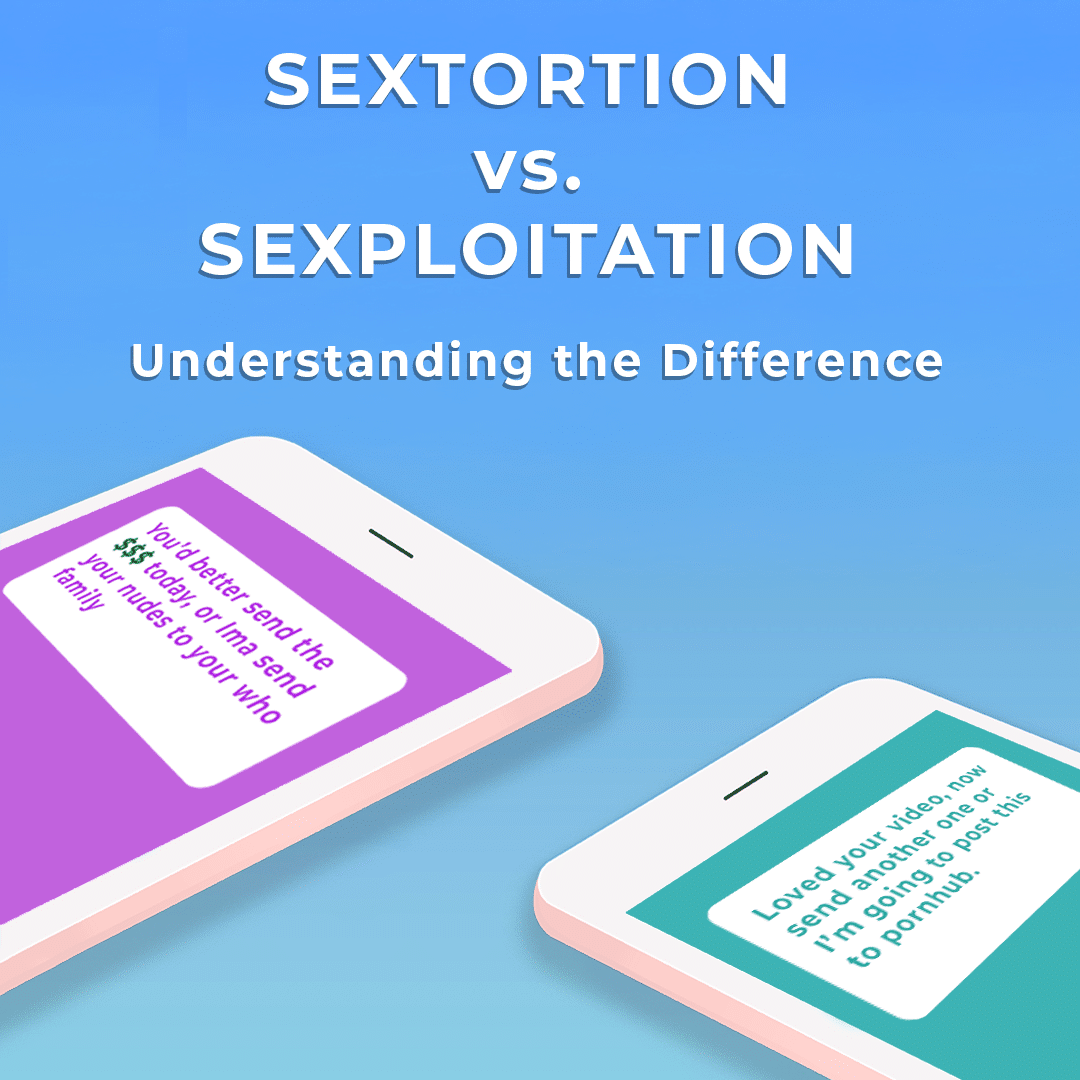Falling victim to any cybercrime can trigger feelings of panic, loneliness, and a desperate desire for the situation to end. The fear and stress from such an experience can be overwhelming, making it hard to think clearly about the next steps to take. It’s natural to feel confused and vulnerable, especially when navigating unfamiliar terms, concepts, and information.
If you have shared personal or intimate content with someone and now find yourself being extorted sexually or financially, whether through demands for money to keep your private content from being exposed or blackmailed online unless you provide more explicit material, understanding your position is essential. Knowing the distinction between sextortion and sexploitation can be a powerful tool in helping you regain control and begin the recovery process.
Is There A Difference Between Sextortion and Sexploitation?
Yes, and the distinction is in what your blackmailer requests. Both involve manipulation and coercion using nudes or other sexual content but one is a form of financial extortion while the other is about sexual exploitation.
- Sextortion: Victims are blackmailed with the threat of exposing their private content unless they pay the blackmailer for their silence.
- Sexploitation: Victims are coerced to providing more intimate content or other sexual favors. Sexploitation is about extracting more personal material under the threat of exposure.
Are These Crimes Committed by Different Types of Criminals?
Yes, these crimes are usually committed by different types of criminals. Even though both threaten exposure, these criminals have different motives.
Sextortion is common among groups of cybercriminals. They use catfishing and fake social media profiles to infiltrate people’s lives. Their goal is to get money, which they make clear from the start.
In sexploitation cases, the blackmailer may be attracted to the victim, especially if they have shared some intimate content. In some cases, the perpetrator is obsessed and participating in additional crimes such as cyberstalking. This makes the situation more dangerous as they seek to please their personal desires.
While organized crime and large trafficking operations contribute to sexploitation, evidence shows that individuals close to their victims are often the main perpetrators. They have personal reasons for sustaining the abuse. (2)
Difference in Threats
In sextortion cases, the scammer often pretends to be in a romantic relationship with their victims. This is a tactic to get to what they really want, intimate content showing the face or other identifying features that can be used to prove their victim’s identity. Once the scammer has what they want, they typically send the threat of public exposure or sending the material directly to the victim’s contacts through social channels. This exposure normally includes the victim’s friends, family, or co-workers; this online blackmail with nudes is a weapon to maintain control over the victim and escalate their demands.
In sexploitation cases, the scammers typically use tactics of coercion and psychological pressure to get the victim to comply. There’s also the possibility that the scammers threaten to publish the material on adult websites or expose the information if they don’t get their desired material or engagement with the victims.
Are You Being Threatened?
If you or someone you know is being pushed into sharing explicit, intimate content or being blackmailed with nudes, it’s important to act fast. These types of online extortion are serious crimes and demand that you take directed action. If you’re looking into protecting yourself from this situation or you’re already trying to handle it, the process is similar for both situations:
- Police report: Filing a police report and finding out if they have local law enforcement for your specific situation. Law enforcement can help you investigate your case, which can lead you to identify and prosecute the criminal.
- Consulting with a Cybersecurity Firm: Cybersecurity experts can help you get your content off the online platforms and minimize the risk of it spreading any further. Experts in the field might help you get your content back and localize your perpetrator’s origin.
Are You At Risk For Exposure Via A Leak?
A recent study by Digital Forensics Corp. found a 42% chance of exposing and publishing intimate material. This was true even if the victim did not respond to the scammer’s demands. Even when the victim tried to disengage or simply “block” the scammer, the risk of exposure is high and required taking informed action.
Get Help from Digital Forensics Corp.
You can find resources to help you navigate this difficult situation and report sextortion. Digital Forensics offers specialized services to help victims like you. We can work on your behalf to attempt the removal of content from virtually any website. While removal is typically permanent, we help monitor and track for re-uploads or reposts to ensure that removed content does not reappear. In cases where content does resurface, we take action to remove it again, maintaining a vigilant defense against repeat infringements.
Our team is available 24/7 to provide a complimentary consultation tailored to your personal situation. These consultations are completely confidential and designed to equip you with the information and guidance needed to take the next steps. Don’t wait, contact our Sextortion Helpline today.
SOURCES:
- Definition of Financial Sextortion: https://www.digitalforensics.com/blog/sextortion-online/what-is-sextortion/
- Definition of Sexploitation: https://www.who.int/docs/default-source/documents/ethics/sexual-exploitation-and-abuse-pamphlet-en.pdf
DISCLAIMER: THIS POST IS FOR INFORMATIONAL PURPOSES ONLY AND IS NOT TO BE CONSIDERED LEGAL ADVICE ON ANY SUBJECT MATTER. DIGITAL FORENSICS CORP. IS NOT A LAWFIRM AND DOES NOT PROVIDE LEGAL ADVICE OR SERVICES. By viewing posts, the reader understands there is no attorney-client relationship, the post should not be used as a substitute for legal advice from a licensed professional attorney, and readers are urged to consult their own legal counsel on any specific legal questions concerning a specific situation.





